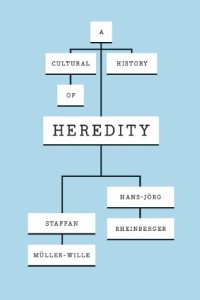
Ebook: A Cultural History of Heredity
- Year: 2012
- Publisher: University of Chicago Press
- Language: English
- pdf
It was only around 1800 that heredity began to enter debates among physicians, breeders, and naturalists. Soon thereafter it evolved into one of the most fundamental concepts of biology. Here Staffan Müller-Wille and Hans-Jörg Rheinberger offer a succinct cultural history of the scientific concept of heredity. They outline the dramatic changes the idea has undergone since the early modern period and describe the political and technological developments that brought about these changes.
Müller-Wille and Rheinberger begin with an account of premodern theories of generation, showing that these were concerned with the procreation of individuals rather than with hereditary transmission. The authors reveal that when hereditarian thinking first emerged, it did so in a variety of cultural domains, such as politics and law, medicine, natural history, breeding, and anthropology. Müller-Wille and Rheinberger then track theories of heredity from the late nineteenth century—when leading biologists considered it in light of growing societal concerns with race and eugenics—through the rise of classical and molecular genetics in the twentieth century, to today, as researchers apply sophisticated information technologies to understand heredity. What readers come to see from this exquisite history is why it took such a long time for heredity to become a prominent concept in the life sciences and why it gained such overwhelming importance in those sciences and the broader culture over the last two centuries.
Staffan Müller-Wille is a senior lecturer and research associate with the ESRC Centre for Genomics in Society and the Centre for Medical History, both at the University of Exeter. Hans-Jörg Rheinberger is director at the Max Planck Institute for the History of Science in Berlin. They are the editors of Heredity Produced: At the Crossroads of Biology, Politics, and Culture, 1500–1870.
Müller-Wille and Rheinberger begin with an account of premodern theories of generation, showing that these were concerned with the procreation of individuals rather than with hereditary transmission. The authors reveal that when hereditarian thinking first emerged, it did so in a variety of cultural domains, such as politics and law, medicine, natural history, breeding, and anthropology. Müller-Wille and Rheinberger then track theories of heredity from the late nineteenth century—when leading biologists considered it in light of growing societal concerns with race and eugenics—through the rise of classical and molecular genetics in the twentieth century, to today, as researchers apply sophisticated information technologies to understand heredity. What readers come to see from this exquisite history is why it took such a long time for heredity to become a prominent concept in the life sciences and why it gained such overwhelming importance in those sciences and the broader culture over the last two centuries.
Staffan Müller-Wille is a senior lecturer and research associate with the ESRC Centre for Genomics in Society and the Centre for Medical History, both at the University of Exeter. Hans-Jörg Rheinberger is director at the Max Planck Institute for the History of Science in Berlin. They are the editors of Heredity Produced: At the Crossroads of Biology, Politics, and Culture, 1500–1870.
Download the book A Cultural History of Heredity for free or read online
Continue reading on any device:

Last viewed books
Related books
{related-news}
Comments (0)